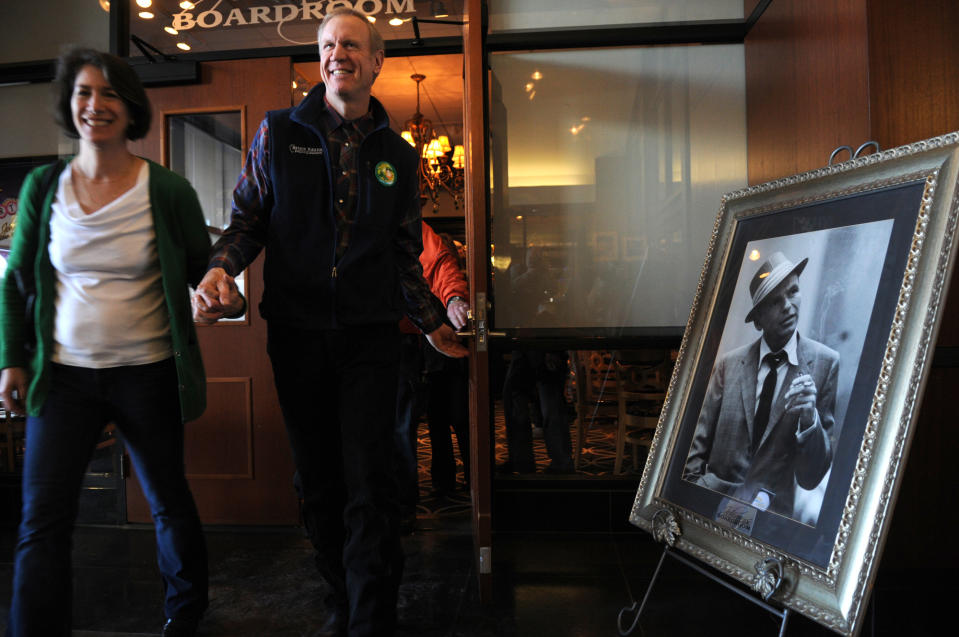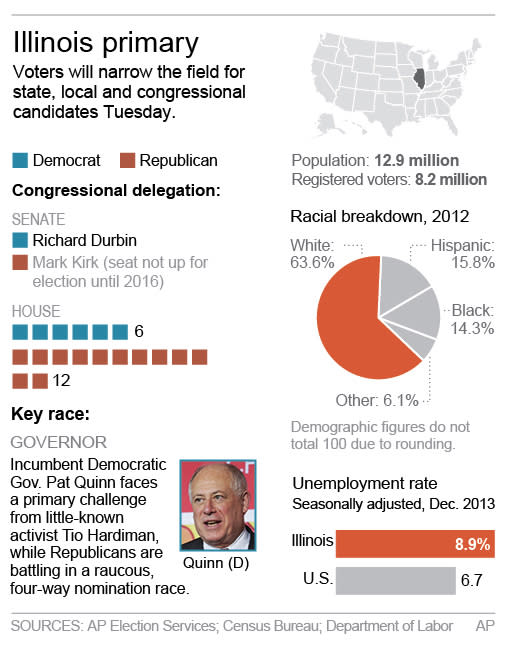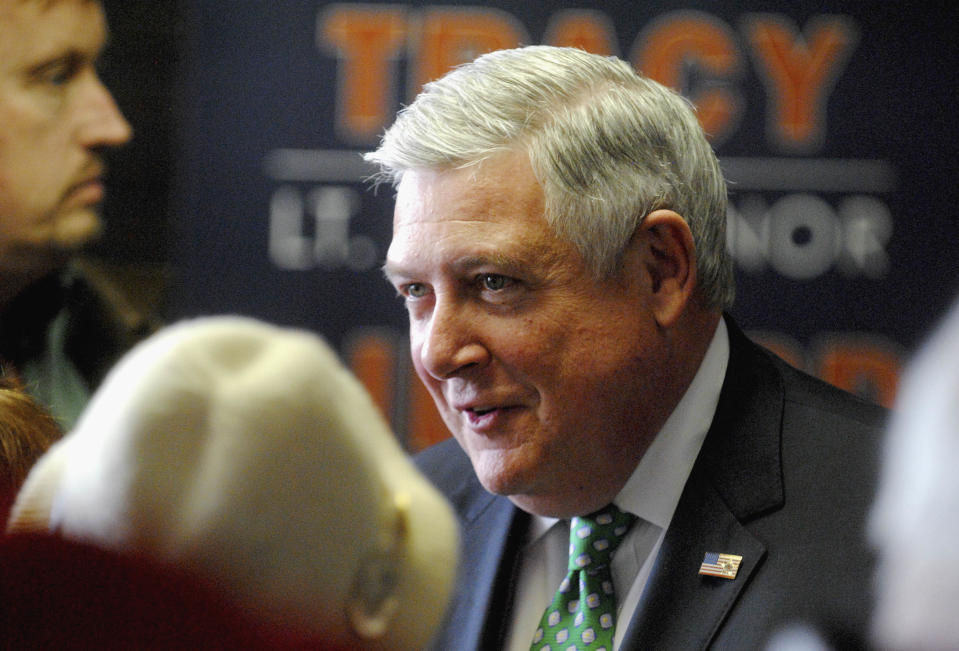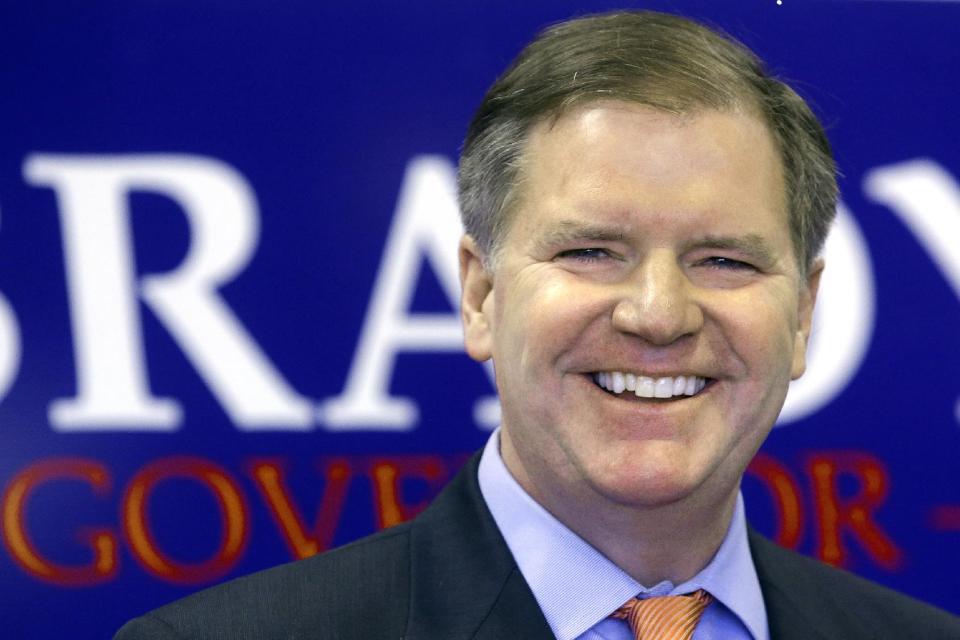Governor candidates gear up for Illinois primary
CHICAGO (AP) — The contenders for Illinois governor crisscrossed the state Monday on the final day of campaigning before the primary elections, with a wealthy venture capitalist trying to fend off three longtime Republican lawmakers to advance to a likely fall matchup with Democratic Gov. Pat Quinn.
The choice on Tuesday will shape a November ballot for what could be Republicans' best chance to take back the governor's office after more than a decade in Democratic control. Illinois' primary also will set up races for Congress, a U.S. Senate seat, the state Legislature, statewide constitutional officers and numerous local offices.
Most gubernatorial candidates focused their final campaigning on Quinn, with three of the four Republicans and one Democratic primary challenger touring the state by plane, bus and car.
"We are going to sweep Pat Quinn into the dustbin of history in Illinois," Bruce Rauner, the Republican venture capitalist, told supporters at a cafe in the northern Illinois community of Rockford before flying downstate. "We're going to get him out of office."
Rauner, who is seeking office for the first time, has led in polls and fundraising over state Sens. Kirk Dillard and Bill Brady and state Treasurer Dan Rutherford in a race that has been heavily focused on unions and the state's financial problems. Quinn, a Chicago Democrat, is widely expected to win over his lesser-known challenger, activist Tio Hardiman.
Still, Hardiman, Dillard and Brady — who lost the 2010 governor's race to Quinn — set out statewide with final pitches.
"If we do what we did last time, we'll win this primary and go on to beat Pat Quinn," said Bloomington Republican Brady, whose scheduled stops included Springfield, Peoria and Chicago.
Dillard, traveled Illinois with his onetime boss, former Gov. Jim Edgar. Dillard was Edgar's chief of staff.
Dillard, of Hinsdale, focused on criticizing Quinn's leadership and Rauner's friendship with Chicago Mayor Rahm Emanuel, a Democrat. Unions have factored into GOP primary, with labor running anti-Rauner ads on television and several of the state's biggest unions backing Dillard.
"I'm tested and I'm prepared," he said between stops in central and southern Illinois. "I'm the only candidate that can send Pat Quinn packing in November."
Meanwhile, Rutherford, who has recently avoided the spotlight, didn't have a public schedule. He's said the last few weeks of his campaign have been "pretty rough" since a former employee filed a lawsuit alleging sexual harassment and political coercion. Rutherford of Chenoa denies the allegations and has called them politically motivated.
He released a short statement Monday calling himself a "reasonable Republican." There was no mention of his opponents.
"As governor, I will do everything I can to create jobs and encourage business growth," the statement said.
Turnout is typically low in primaries and experts say there isn't much in the final hours that can sway voters, aside from a late-breaking scandal or massive get-out-the-vote efforts. Though others cautioned against relying heavily on primary polls.
"It's down to ground game," said Doug O'Brien, who was chief aide to Republican U.S. Sen. Mark Kirk while he was an Illinois congressman. "Ground game might be able to tighten the margin a little bit."
Dillard said he'd receive so-called "crossover votes," or Democrats pulling Republican ballots to support him over Rauner.
However, political experts said accomplishing that would be a feat, as it would take scores of Democrats to vote Republican in the traditionally low-turnout election in order for him to achieve a win. Some polls show Dillard behind Rauner by roughly 20 percentage points.
About 23 percent of Illinois' registered voters showed up to the polls in both 2012 and 2010 primaries, according to the Illinois State Board of Elections. In Chicago, it was a smidge higher, when about 24 percent of registered Chicago voters cast ballots in the 2012 primary and 27 percent in 2010's primary.
Both years were far below the 2008 primary when President Barack Obama was first elected. Almost 41 percent of Illinois' registered voters came to that year's primary and nearly 53 percent of Chicago voters did.
The crowds that showed up to events Monday were enthusiastic.
More than two dozen supporters filled the dining room of an Italian deli and grocery in the southern Illinois community of Herrin, where Rauner stopped late Monday.
Keith Camarato, a retired business owner, said he's supporting Rauner of Winnetka because he likes his plan to establish term limits for legislators. He also said it's time to put a businessman, not a politician, in power.
"I really like the term limit proposal," said Camarato, who raised his hands and clapped when Rauner mentioned the plan during his remarks. "I think that will clean house in Springfield. And that needs to be done."
Candidates' focus on Monday, however, remained on efforts to beat Quinn.
The Chicago Democrat, who is seeking a second full term, has hardly campaigned in the primary and kept a quieter-than-usual schedule with his gubernatorial duties in the last few weeks. He has said that he's focused on being governor, but has questioned the entrance of "big money" in the race, alluding to a possible challenge from Rauner, who has raised millions through his personal wealth and contacts.
Quinn's challenger, an anti-violence activist from suburban Chicago, traveled by car to scheduled stops at universities in Peoria, Champaign and Bloomington.
Tuesday's primary will also help determine a Republican challenger to Democratic U.S. Sen. Dick Durbin, U.S. House races in Chicago's suburbs and downstate and races for the state House and Senate.
___
Follow Sara Burnett at http://twitter.com/sara_burnett and Sophia Tareen at http://twitter.com/sophiatareen .
___
Burnett reported from Rockford, Moline, Edwardsville and Herrin.










